Analyzing Learning, Communication, Assessment, and Curriculum Theories
VerifiedAdded on 2023/01/03
|15
|1481
|68
Report
AI Summary
This report provides a comprehensive analysis of various theories, models, and principles related to learning, communication, assessment, and curriculum development. It begins with an introduction to education and training, emphasizing the difference between training and education. The report delves into cognitive, behaviorism, and humanism theories of learning, as well as the VARK and Gregorc models. It explores principles of learning such as involvement, continuation, and relevancy. The report also examines communication theories, including the actor-network and agenda-setting theories. Furthermore, it analyzes assessment theories, focusing on reaction, learning, and transfer. The report also discusses curriculum development theories, including structure-oriented, value-oriented, and content-oriented approaches. Finally, it presents theories of reflection and evaluation, such as the empiricist and dialectical theories, before concluding with a summary of the key findings and a list of references. The report provides insights into how these theories and models can be applied in educational settings.
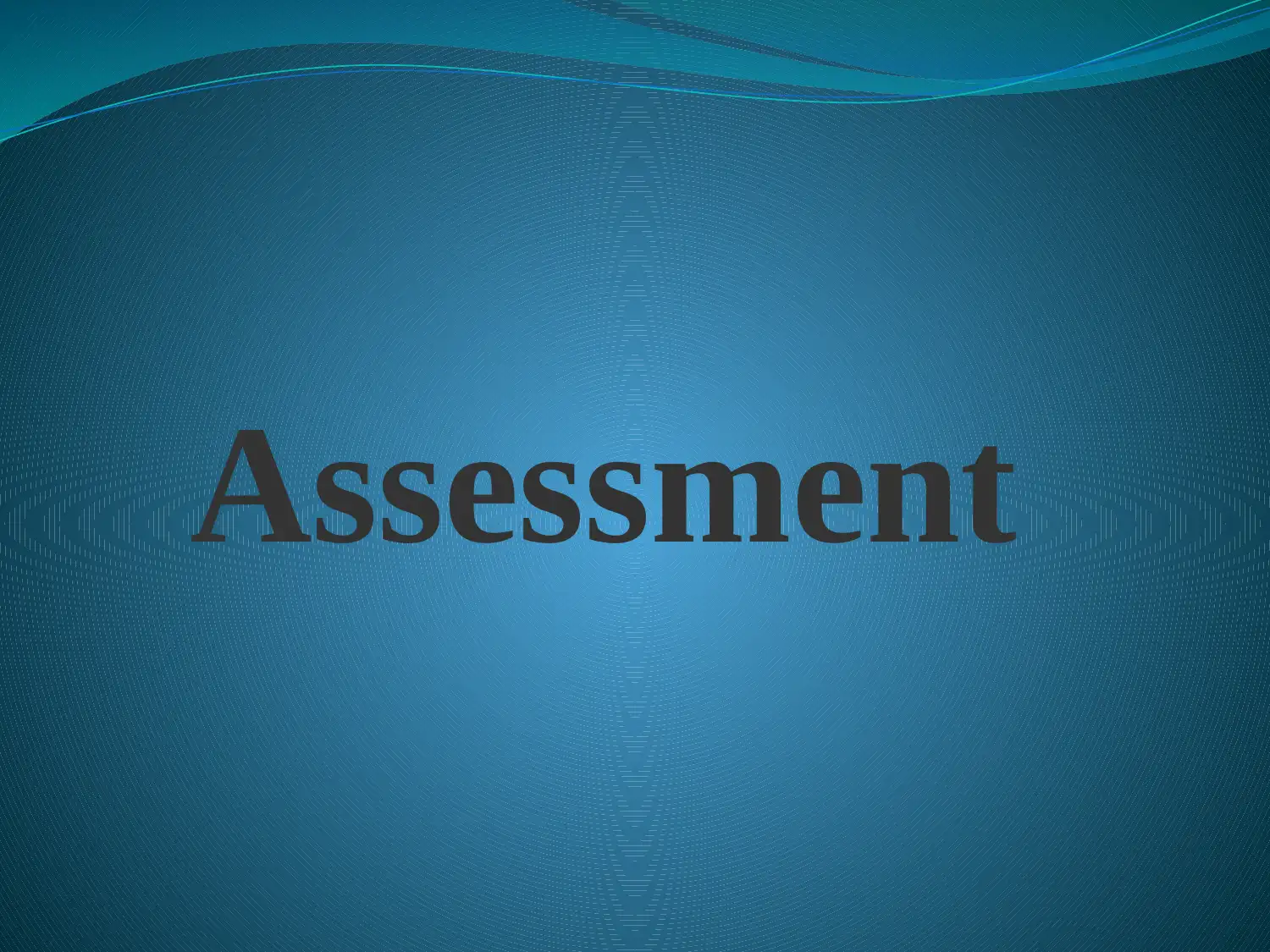
Assessment
Paraphrase This Document
Need a fresh take? Get an instant paraphrase of this document with our AI Paraphraser
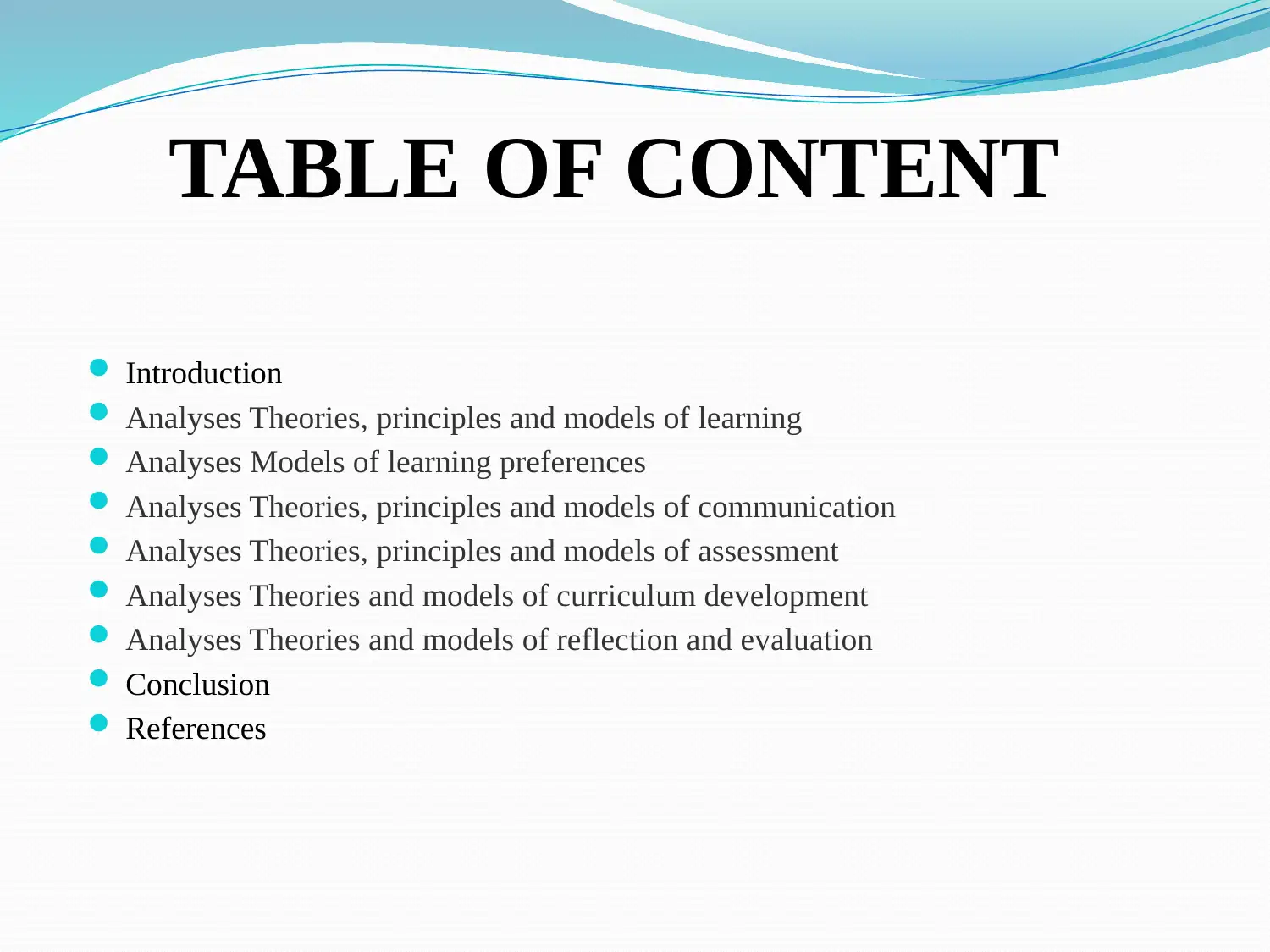
TABLE OF CONTENT
Introduction
Analyses Theories, principles and models of learning
Analyses Models of learning preferences
Analyses Theories, principles and models of communication
Analyses Theories, principles and models of assessment
Analyses Theories and models of curriculum development
Analyses Theories and models of reflection and evaluation
Conclusion
References
Introduction
Analyses Theories, principles and models of learning
Analyses Models of learning preferences
Analyses Theories, principles and models of communication
Analyses Theories, principles and models of assessment
Analyses Theories and models of curriculum development
Analyses Theories and models of reflection and evaluation
Conclusion
References
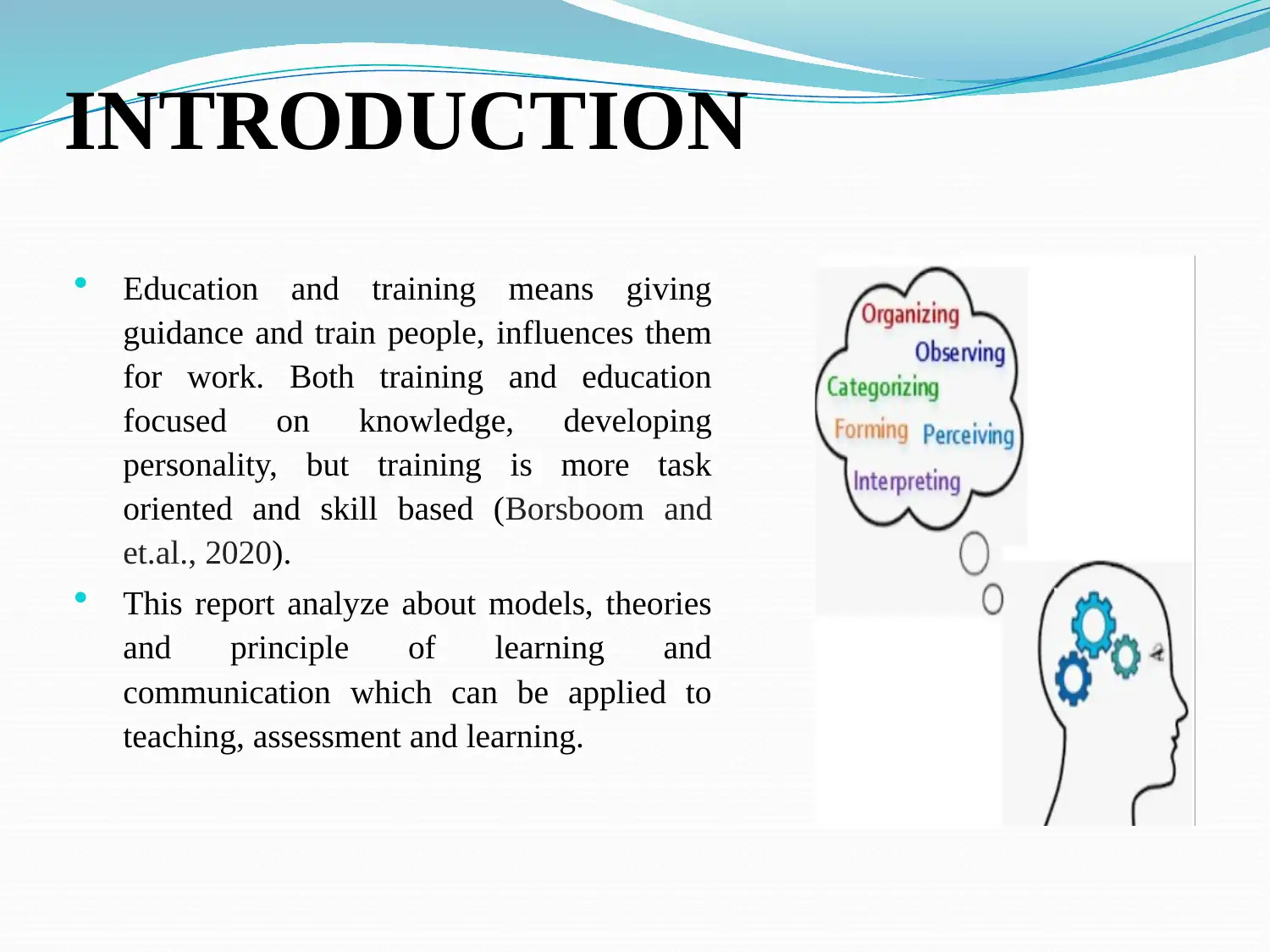
INTRODUCTION
Education and training means giving
guidance and train people, influences them
for work. Both training and education
focused on knowledge, developing
personality, but training is more task
oriented and skill based (Borsboom and
et.al., 2020).
This report analyze about models, theories
and principle of learning and
communication which can be applied to
teaching, assessment and learning.
Education and training means giving
guidance and train people, influences them
for work. Both training and education
focused on knowledge, developing
personality, but training is more task
oriented and skill based (Borsboom and
et.al., 2020).
This report analyze about models, theories
and principle of learning and
communication which can be applied to
teaching, assessment and learning.
⊘ This is a preview!⊘
Do you want full access?
Subscribe today to unlock all pages.

Trusted by 1+ million students worldwide
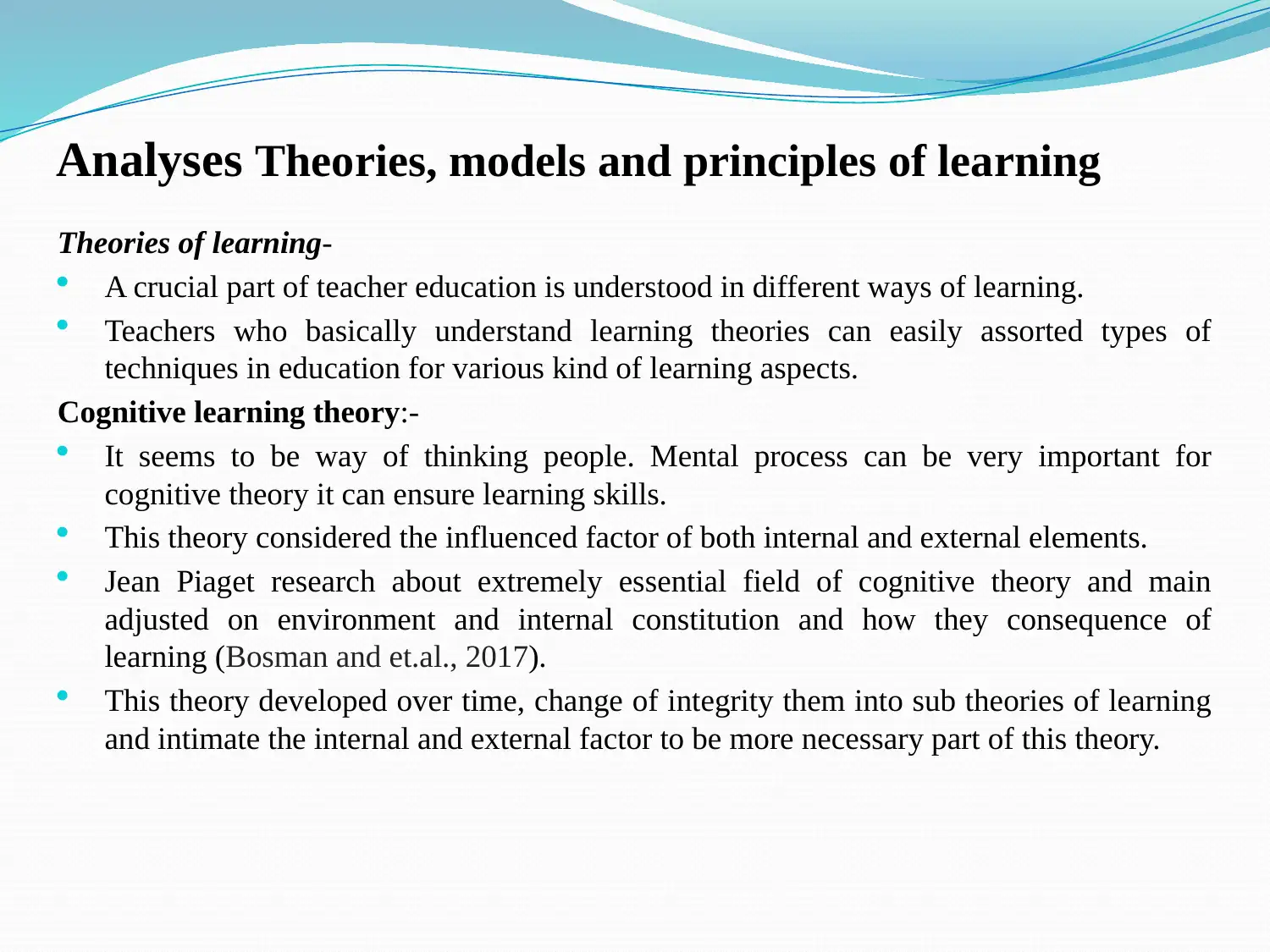
Analyses Theories, models and principles of learning
Theories of learning-
A crucial part of teacher education is understood in different ways of learning.
Teachers who basically understand learning theories can easily assorted types of
techniques in education for various kind of learning aspects.
Cognitive learning theory:-
It seems to be way of thinking people. Mental process can be very important for
cognitive theory it can ensure learning skills.
This theory considered the influenced factor of both internal and external elements.
Jean Piaget research about extremely essential field of cognitive theory and main
adjusted on environment and internal constitution and how they consequence of
learning (Bosman and et.al., 2017).
This theory developed over time, change of integrity them into sub theories of learning
and intimate the internal and external factor to be more necessary part of this theory.
Theories of learning-
A crucial part of teacher education is understood in different ways of learning.
Teachers who basically understand learning theories can easily assorted types of
techniques in education for various kind of learning aspects.
Cognitive learning theory:-
It seems to be way of thinking people. Mental process can be very important for
cognitive theory it can ensure learning skills.
This theory considered the influenced factor of both internal and external elements.
Jean Piaget research about extremely essential field of cognitive theory and main
adjusted on environment and internal constitution and how they consequence of
learning (Bosman and et.al., 2017).
This theory developed over time, change of integrity them into sub theories of learning
and intimate the internal and external factor to be more necessary part of this theory.
Paraphrase This Document
Need a fresh take? Get an instant paraphrase of this document with our AI Paraphraser
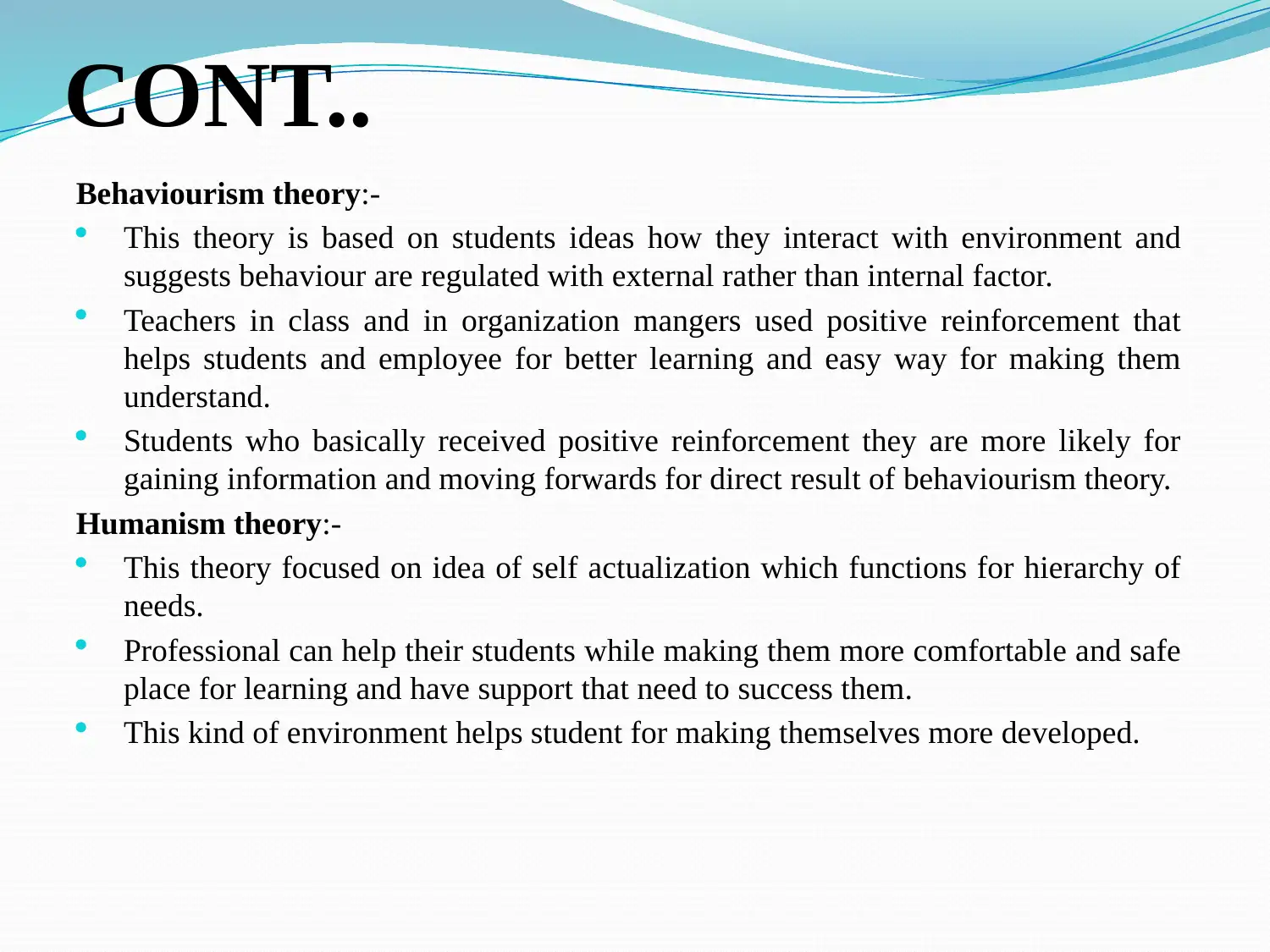
CONT..
Behaviourism theory:-
This theory is based on students ideas how they interact with environment and
suggests behaviour are regulated with external rather than internal factor.
Teachers in class and in organization mangers used positive reinforcement that
helps students and employee for better learning and easy way for making them
understand.
Students who basically received positive reinforcement they are more likely for
gaining information and moving forwards for direct result of behaviourism theory.
Humanism theory:-
This theory focused on idea of self actualization which functions for hierarchy of
needs.
Professional can help their students while making them more comfortable and safe
place for learning and have support that need to success them.
This kind of environment helps student for making themselves more developed.
Behaviourism theory:-
This theory is based on students ideas how they interact with environment and
suggests behaviour are regulated with external rather than internal factor.
Teachers in class and in organization mangers used positive reinforcement that
helps students and employee for better learning and easy way for making them
understand.
Students who basically received positive reinforcement they are more likely for
gaining information and moving forwards for direct result of behaviourism theory.
Humanism theory:-
This theory focused on idea of self actualization which functions for hierarchy of
needs.
Professional can help their students while making them more comfortable and safe
place for learning and have support that need to success them.
This kind of environment helps student for making themselves more developed.
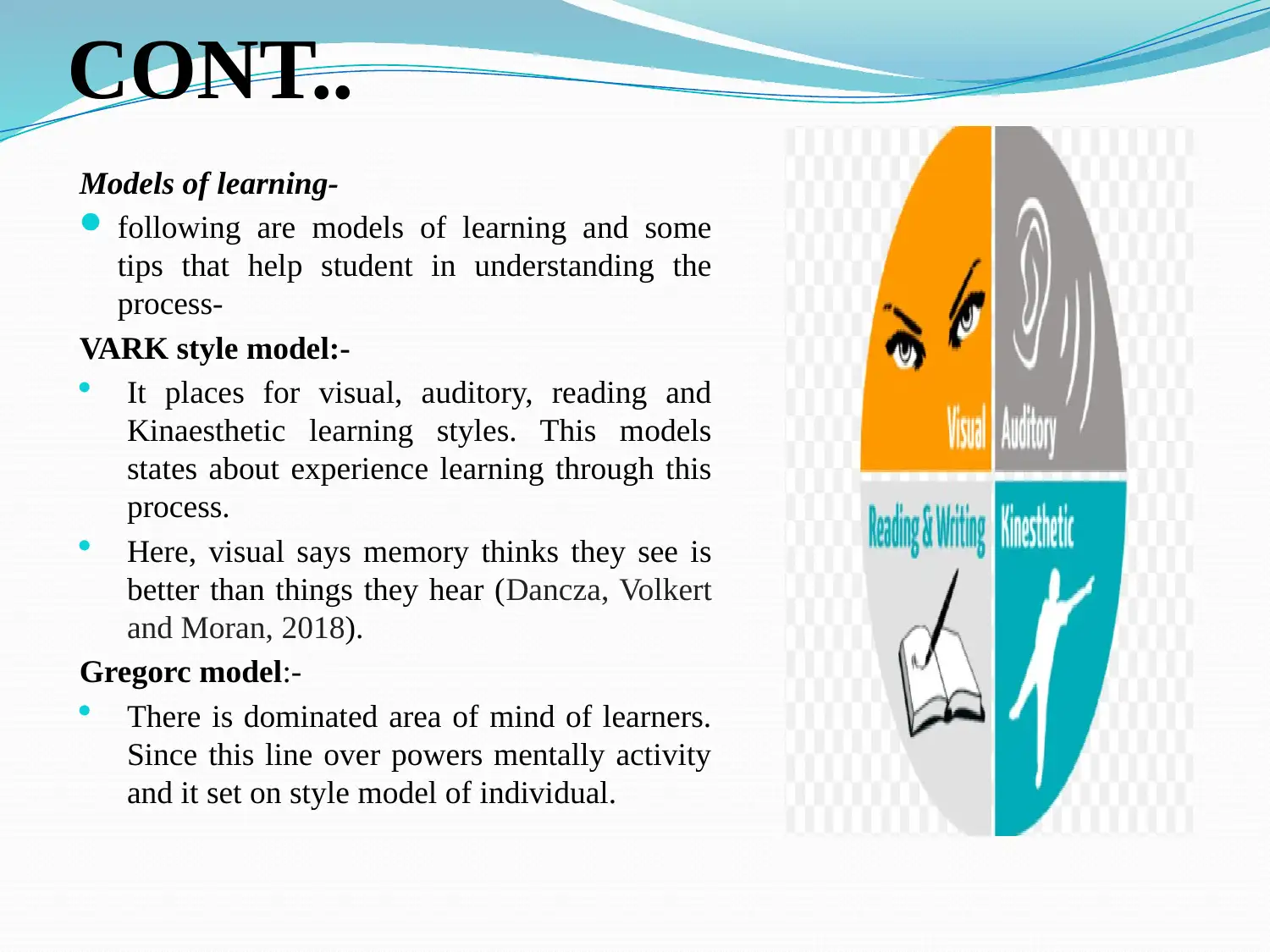
CONT..
Models of learning-
following are models of learning and some
tips that help student in understanding the
process-
VARK style model:-
It places for visual, auditory, reading and
Kinaesthetic learning styles. This models
states about experience learning through this
process.
Here, visual says memory thinks they see is
better than things they hear (Dancza, Volkert
and Moran, 2018).
Gregorc model:-
There is dominated area of mind of learners.
Since this line over powers mentally activity
and it set on style model of individual.
Models of learning-
following are models of learning and some
tips that help student in understanding the
process-
VARK style model:-
It places for visual, auditory, reading and
Kinaesthetic learning styles. This models
states about experience learning through this
process.
Here, visual says memory thinks they see is
better than things they hear (Dancza, Volkert
and Moran, 2018).
Gregorc model:-
There is dominated area of mind of learners.
Since this line over powers mentally activity
and it set on style model of individual.
⊘ This is a preview!⊘
Do you want full access?
Subscribe today to unlock all pages.

Trusted by 1+ million students worldwide
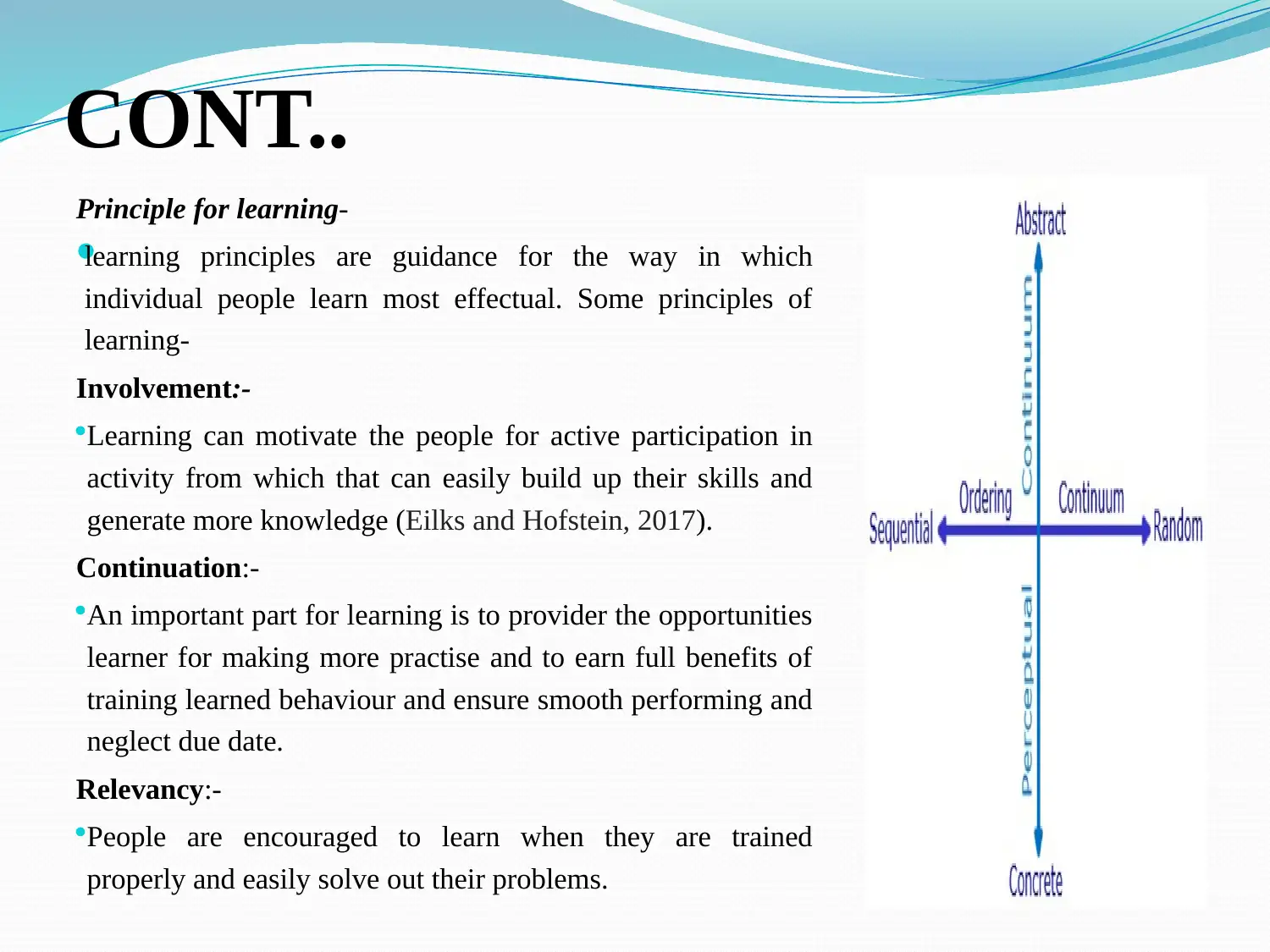
CONT..
Principle for learning-
learning principles are guidance for the way in which
individual people learn most effectual. Some principles of
learning-
Involvement:-
Learning can motivate the people for active participation in
activity from which that can easily build up their skills and
generate more knowledge (Eilks and Hofstein, 2017).
Continuation:-
An important part for learning is to provider the opportunities
learner for making more practise and to earn full benefits of
training learned behaviour and ensure smooth performing and
neglect due date.
Relevancy:-
People are encouraged to learn when they are trained
properly and easily solve out their problems.
Principle for learning-
learning principles are guidance for the way in which
individual people learn most effectual. Some principles of
learning-
Involvement:-
Learning can motivate the people for active participation in
activity from which that can easily build up their skills and
generate more knowledge (Eilks and Hofstein, 2017).
Continuation:-
An important part for learning is to provider the opportunities
learner for making more practise and to earn full benefits of
training learned behaviour and ensure smooth performing and
neglect due date.
Relevancy:-
People are encouraged to learn when they are trained
properly and easily solve out their problems.
Paraphrase This Document
Need a fresh take? Get an instant paraphrase of this document with our AI Paraphraser
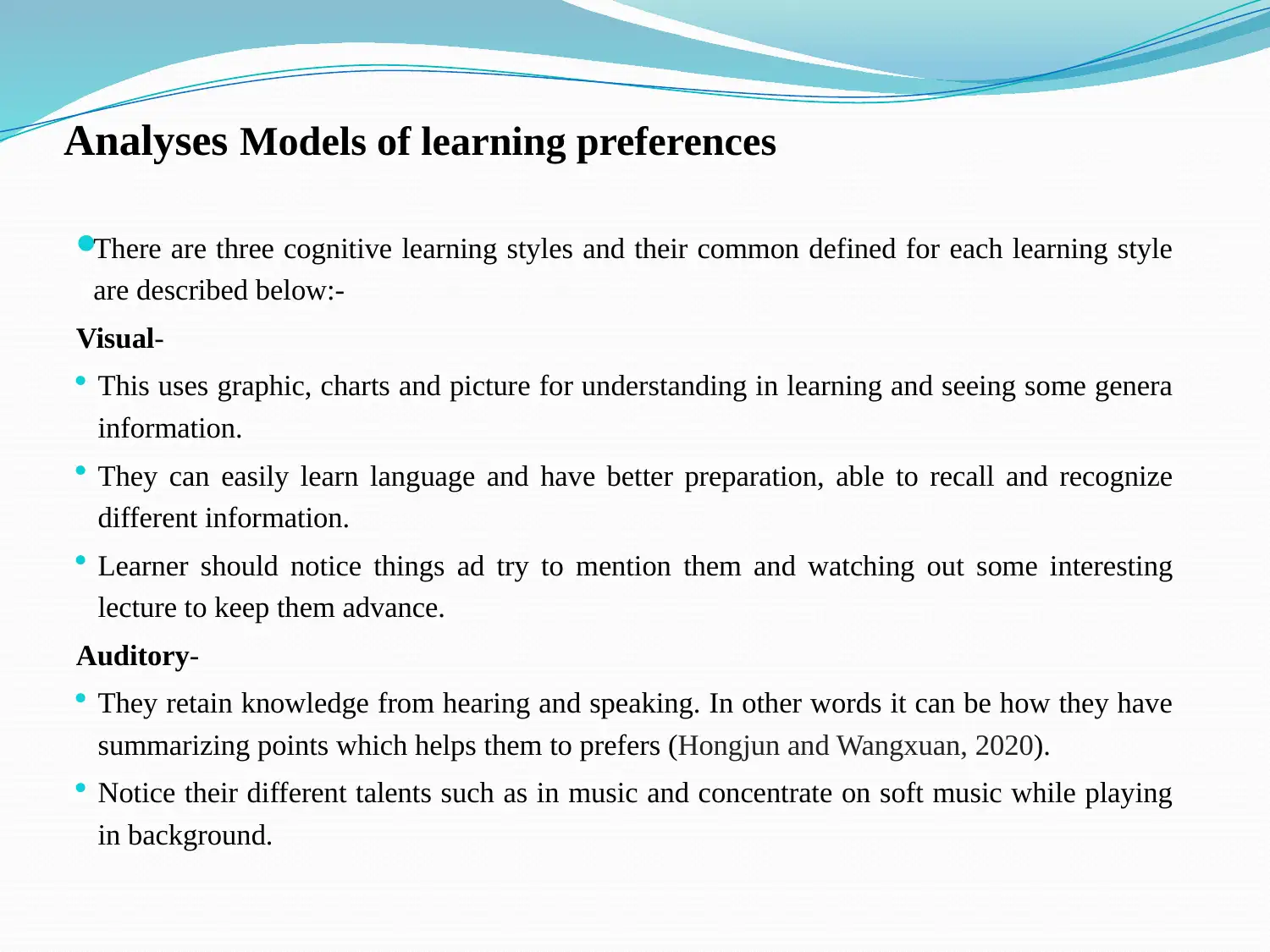
Analyses Models of learning preferences
There are three cognitive learning styles and their common defined for each learning style
are described below:-
Visual-
This uses graphic, charts and picture for understanding in learning and seeing some genera
information.
They can easily learn language and have better preparation, able to recall and recognize
different information.
Learner should notice things ad try to mention them and watching out some interesting
lecture to keep them advance.
Auditory-
They retain knowledge from hearing and speaking. In other words it can be how they have
summarizing points which helps them to prefers (Hongjun and Wangxuan, 2020).
Notice their different talents such as in music and concentrate on soft music while playing
in background.
There are three cognitive learning styles and their common defined for each learning style
are described below:-
Visual-
This uses graphic, charts and picture for understanding in learning and seeing some genera
information.
They can easily learn language and have better preparation, able to recall and recognize
different information.
Learner should notice things ad try to mention them and watching out some interesting
lecture to keep them advance.
Auditory-
They retain knowledge from hearing and speaking. In other words it can be how they have
summarizing points which helps them to prefers (Hongjun and Wangxuan, 2020).
Notice their different talents such as in music and concentrate on soft music while playing
in background.
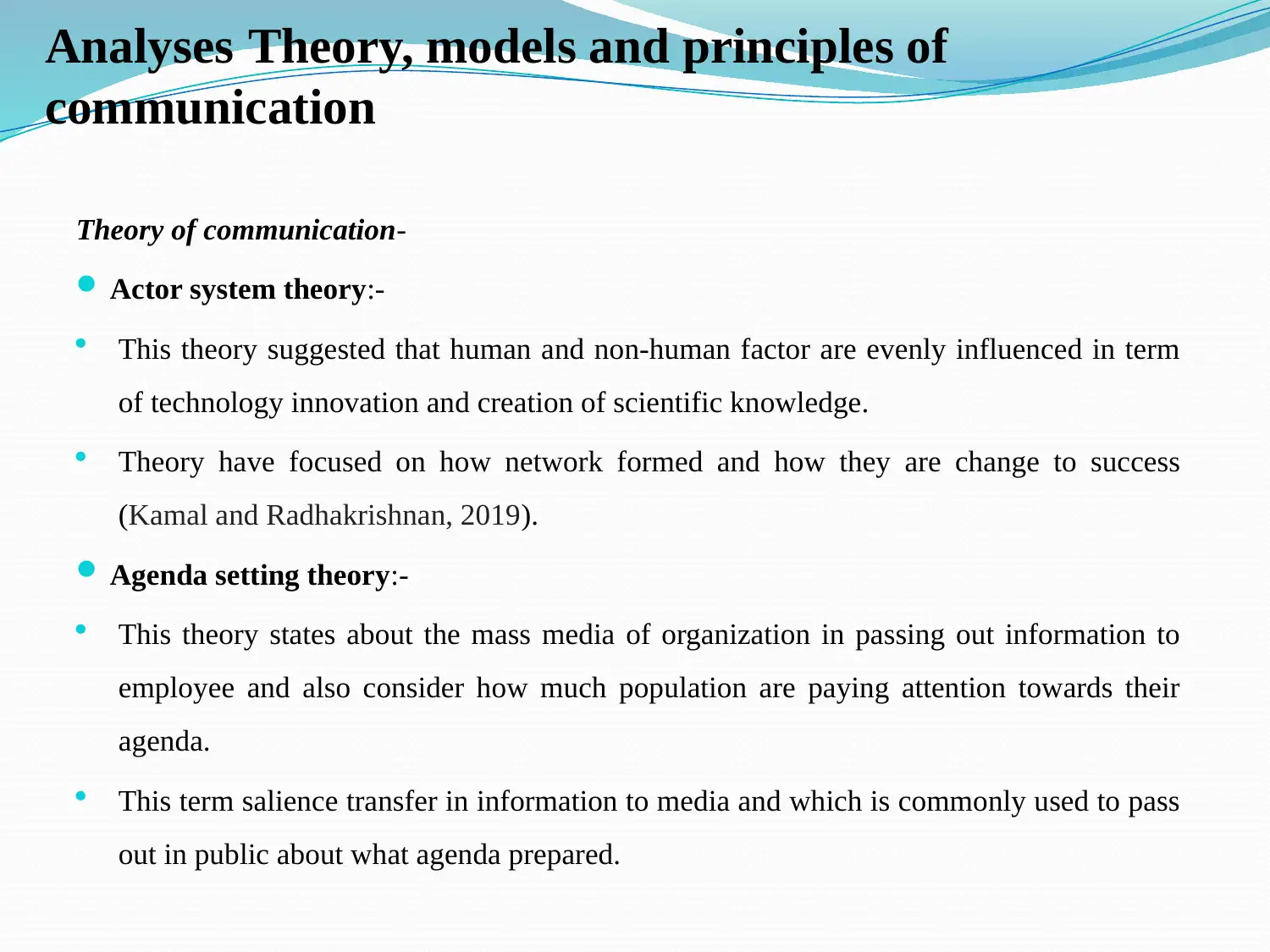
Analyses Theory, models and principles of
communication
Theory of communication-
Actor system theory:-
This theory suggested that human and non-human factor are evenly influenced in term
of technology innovation and creation of scientific knowledge.
Theory have focused on how network formed and how they are change to success
(Kamal and Radhakrishnan, 2019).
Agenda setting theory:-
This theory states about the mass media of organization in passing out information to
employee and also consider how much population are paying attention towards their
agenda.
This term salience transfer in information to media and which is commonly used to pass
out in public about what agenda prepared.
communication
Theory of communication-
Actor system theory:-
This theory suggested that human and non-human factor are evenly influenced in term
of technology innovation and creation of scientific knowledge.
Theory have focused on how network formed and how they are change to success
(Kamal and Radhakrishnan, 2019).
Agenda setting theory:-
This theory states about the mass media of organization in passing out information to
employee and also consider how much population are paying attention towards their
agenda.
This term salience transfer in information to media and which is commonly used to pass
out in public about what agenda prepared.
⊘ This is a preview!⊘
Do you want full access?
Subscribe today to unlock all pages.

Trusted by 1+ million students worldwide
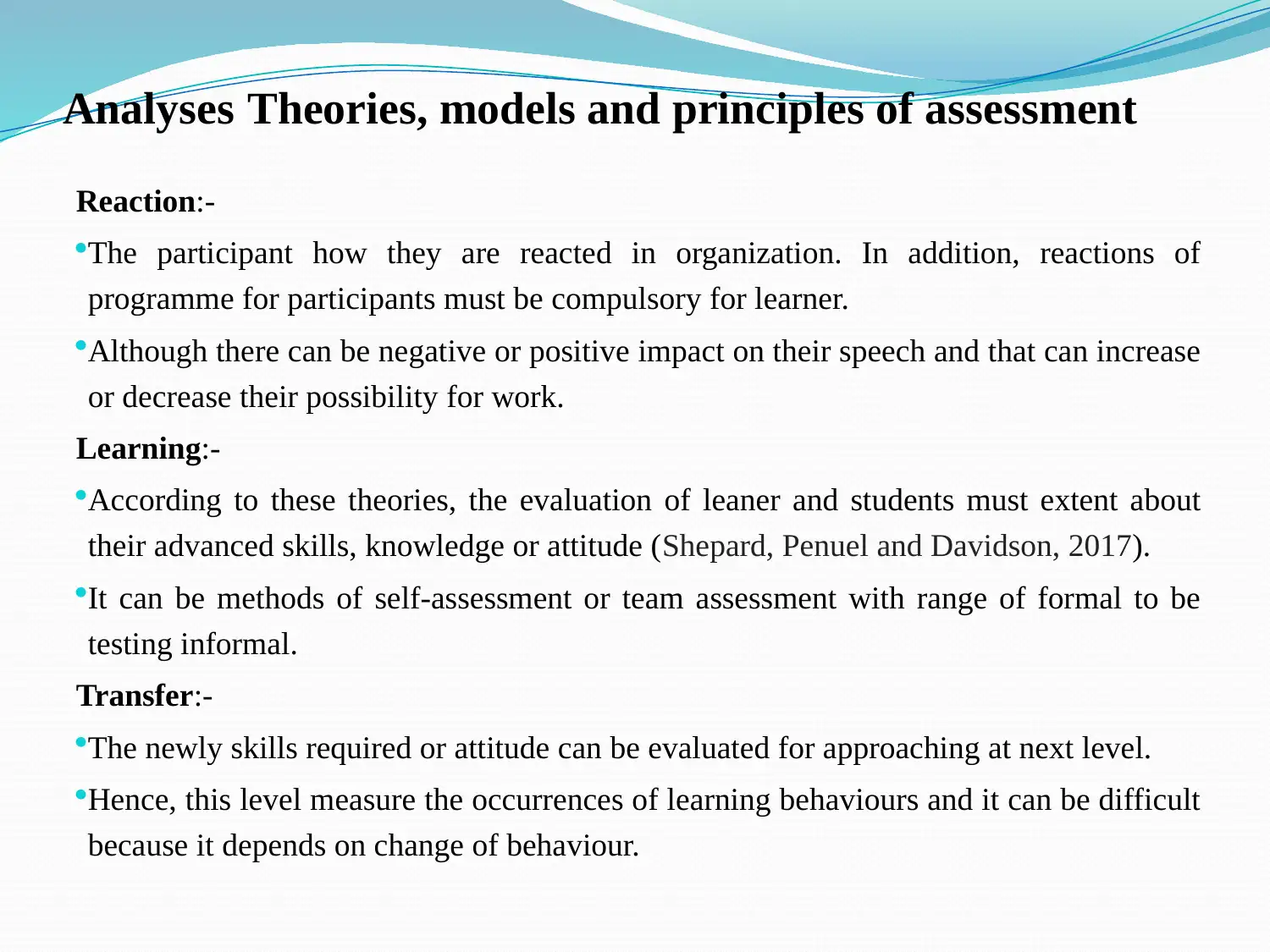
Analyses Theories, models and principles of assessment
Reaction:-
The participant how they are reacted in organization. In addition, reactions of
programme for participants must be compulsory for learner.
Although there can be negative or positive impact on their speech and that can increase
or decrease their possibility for work.
Learning:-
According to these theories, the evaluation of leaner and students must extent about
their advanced skills, knowledge or attitude (Shepard, Penuel and Davidson, 2017).
It can be methods of self-assessment or team assessment with range of formal to be
testing informal.
Transfer:-
The newly skills required or attitude can be evaluated for approaching at next level.
Hence, this level measure the occurrences of learning behaviours and it can be difficult
because it depends on change of behaviour.
Reaction:-
The participant how they are reacted in organization. In addition, reactions of
programme for participants must be compulsory for learner.
Although there can be negative or positive impact on their speech and that can increase
or decrease their possibility for work.
Learning:-
According to these theories, the evaluation of leaner and students must extent about
their advanced skills, knowledge or attitude (Shepard, Penuel and Davidson, 2017).
It can be methods of self-assessment or team assessment with range of formal to be
testing informal.
Transfer:-
The newly skills required or attitude can be evaluated for approaching at next level.
Hence, this level measure the occurrences of learning behaviours and it can be difficult
because it depends on change of behaviour.
Paraphrase This Document
Need a fresh take? Get an instant paraphrase of this document with our AI Paraphraser
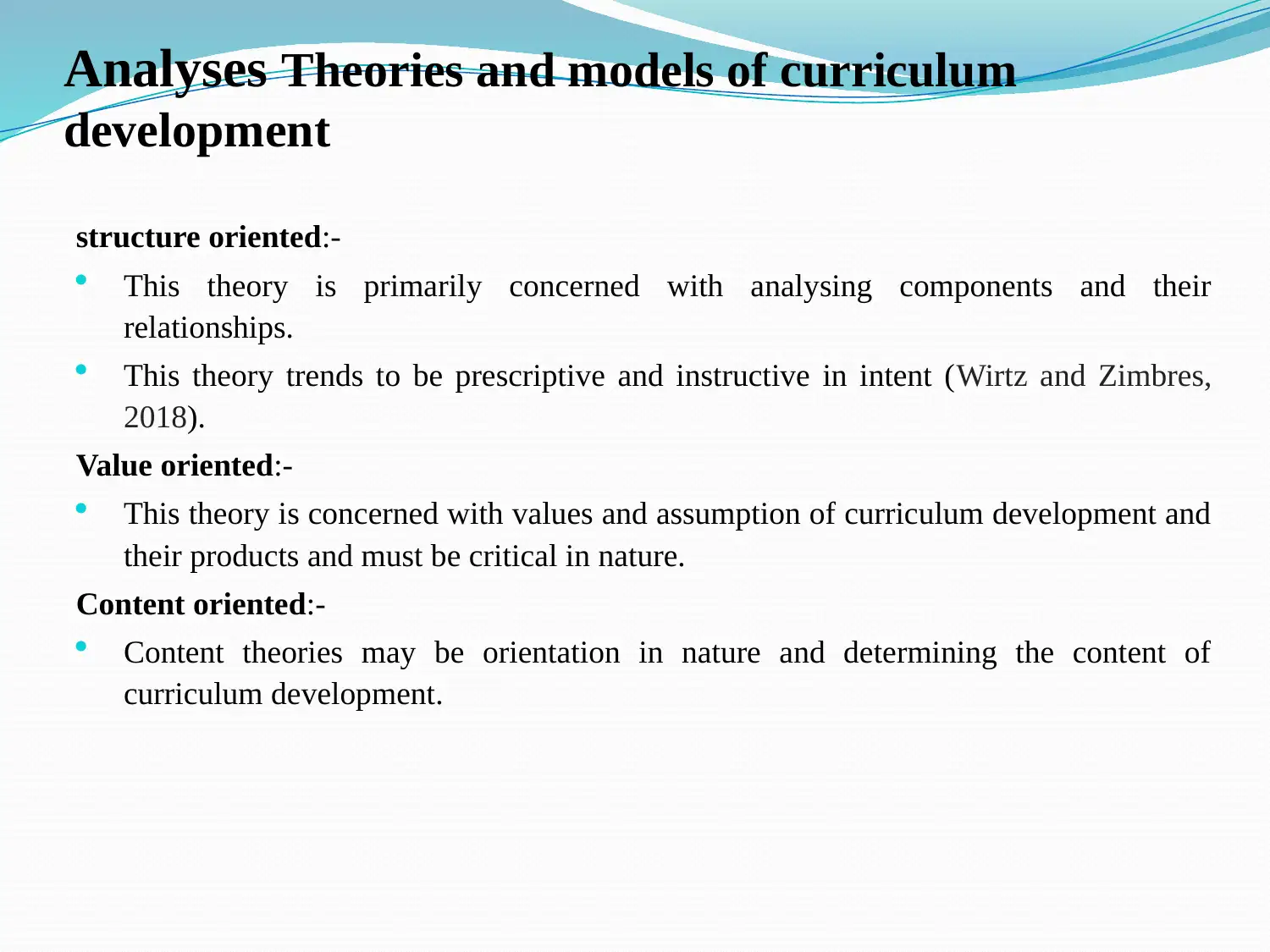
Analyses Theories and models of curriculum
development
structure oriented:-
This theory is primarily concerned with analysing components and their
relationships.
This theory trends to be prescriptive and instructive in intent (Wirtz and Zimbres,
2018).
Value oriented:-
This theory is concerned with values and assumption of curriculum development and
their products and must be critical in nature.
Content oriented:-
Content theories may be orientation in nature and determining the content of
curriculum development.
development
structure oriented:-
This theory is primarily concerned with analysing components and their
relationships.
This theory trends to be prescriptive and instructive in intent (Wirtz and Zimbres,
2018).
Value oriented:-
This theory is concerned with values and assumption of curriculum development and
their products and must be critical in nature.
Content oriented:-
Content theories may be orientation in nature and determining the content of
curriculum development.
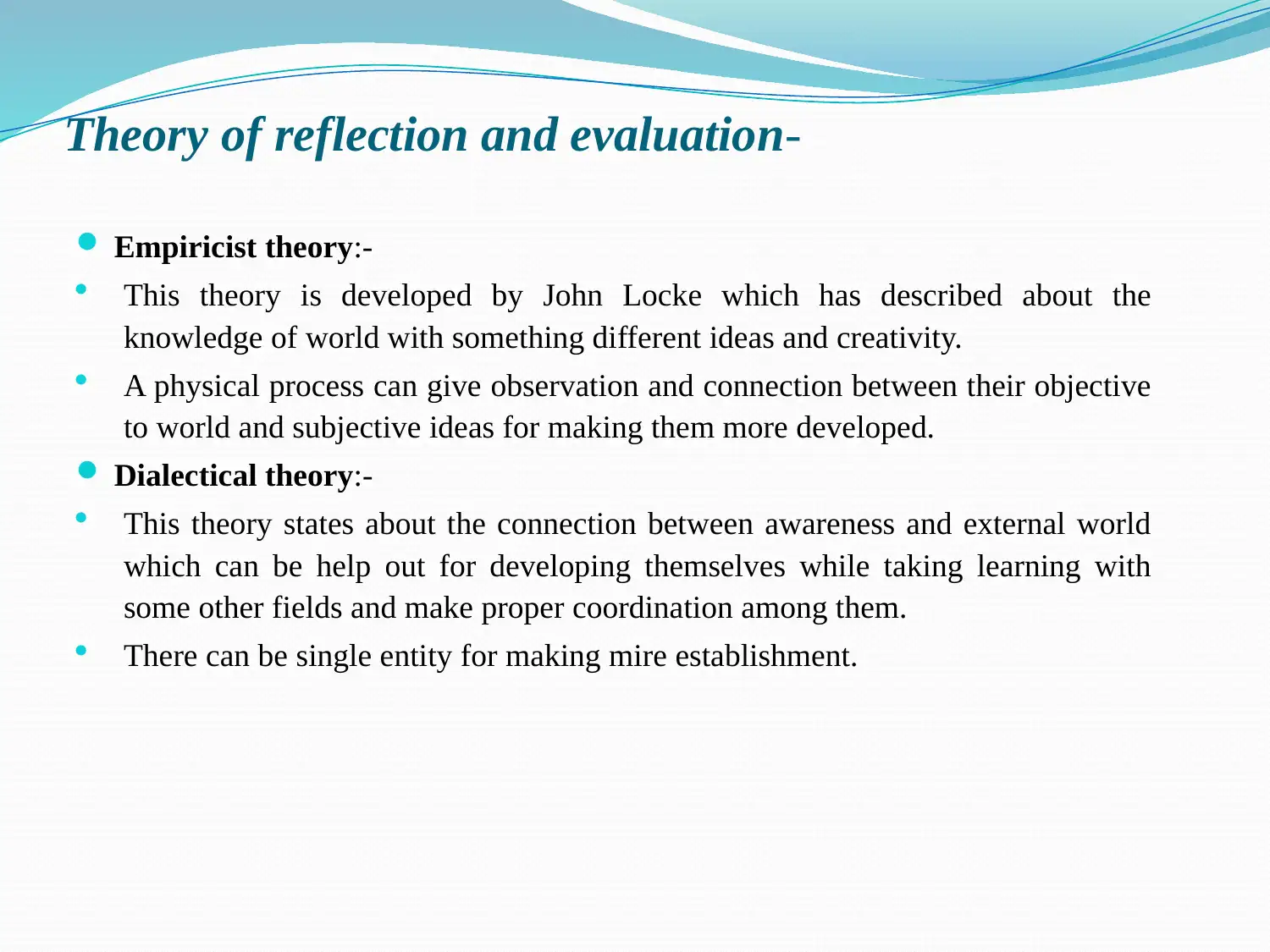
Theory of reflection and evaluation-
Empiricist theory:-
This theory is developed by John Locke which has described about the
knowledge of world with something different ideas and creativity.
A physical process can give observation and connection between their objective
to world and subjective ideas for making them more developed.
Dialectical theory:-
This theory states about the connection between awareness and external world
which can be help out for developing themselves while taking learning with
some other fields and make proper coordination among them.
There can be single entity for making mire establishment.
Empiricist theory:-
This theory is developed by John Locke which has described about the
knowledge of world with something different ideas and creativity.
A physical process can give observation and connection between their objective
to world and subjective ideas for making them more developed.
Dialectical theory:-
This theory states about the connection between awareness and external world
which can be help out for developing themselves while taking learning with
some other fields and make proper coordination among them.
There can be single entity for making mire establishment.
⊘ This is a preview!⊘
Do you want full access?
Subscribe today to unlock all pages.

Trusted by 1+ million students worldwide
1 out of 15
Related Documents
Your All-in-One AI-Powered Toolkit for Academic Success.
+13062052269
info@desklib.com
Available 24*7 on WhatsApp / Email
![[object Object]](/_next/static/media/star-bottom.7253800d.svg)
Unlock your academic potential
Copyright © 2020–2026 A2Z Services. All Rights Reserved. Developed and managed by ZUCOL.


